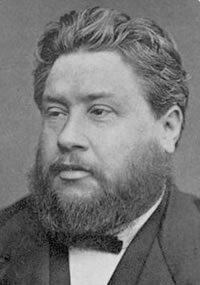AOG guards against threats to the Gospel like atheism, Islam, Buddhism... and Calvinism?
Body
Discussion
Calvinism debate in the SBC continues as Al Mohler weighs in
Body
Discussion
"Too often, what we want is to be right, rather than to build up one another in the faith."
Body
Discussion
MacArthur: Grow Up. Settle Down. Keep Reforming. Advice for the Young, Restless, Reformed
Body
Discussion
Calvinists Who Love Wesley
Discussion
Spurgeon and the Battle for Gospel Preaching, Part 1
First appeared at SharperIron Oct. 15, 2007 with the permission of Brookside Baptist Church.
The true minister of Christ feels impelled to preach the whole truth, because it and it alone can meet the wants of man. What evils has this world seen through a distorted, mangled, man-moulded gospel. What mischiefs have been done to the souls of men by men who have preached only one part and not all the counsel of God!
—C.H. Spurgeon, Metropolitan Tabernacle, 1859
Hyper-Calvinsim is all house and no door; Arminianism is all door and no house.
—John Duncan
Introduction
On April 28, 1854, a 19-year-old boy-preacher assumed the pastorate of New Park Street Chapel in London, England. He remained in this ministry for more than four decades. Throughout the course of his ministry, God did mighty works, and unusual advances were made for the gospel of Jesus Christ. During his ministry, Charles Spurgeon saw more than 14,000 new members added to New Park Street Chapel. He enjoyed the blessing and provision of the Lord through several expansions and building programs. He founded an orphanage and a college for training ministers. He preached to thousands each week. On one occasion, he preached to more than 30,000 people at one time. His was a household name, and even hansom (cab) drivers instinctively knew to take people over the river to “Charlie’s.” Two thousand two hundred and forty-one of his sermons were in print at the time of his death. Today, more than 300 million copies of his sermons and books are in print, making him one of the most prolific authors in the English-speaking world.
The preceding details of Spurgeon’s ministry are well known to most preachers who have had any measure of exposure to Church history. His rich spiritual heritage has been chronicled in scores of biographies and other literature related to his life. One aspect of his ministry, however, has received little or no attention until recently—the prolonged doctrinal controversy surrounding his practice of openly inviting all men to respond to the invitation of the gospel. The details and ramifications of this controversy can be found in a fairly recent book by Iain Murray entitled Spurgeon v. Hyper-Calvinism: The Battle for Gospel Preaching. Published in 1995 by Banner of Truth, this work provides an understanding of the nature, extent, and doctrinal issues surrounding the controversy.

Discussion